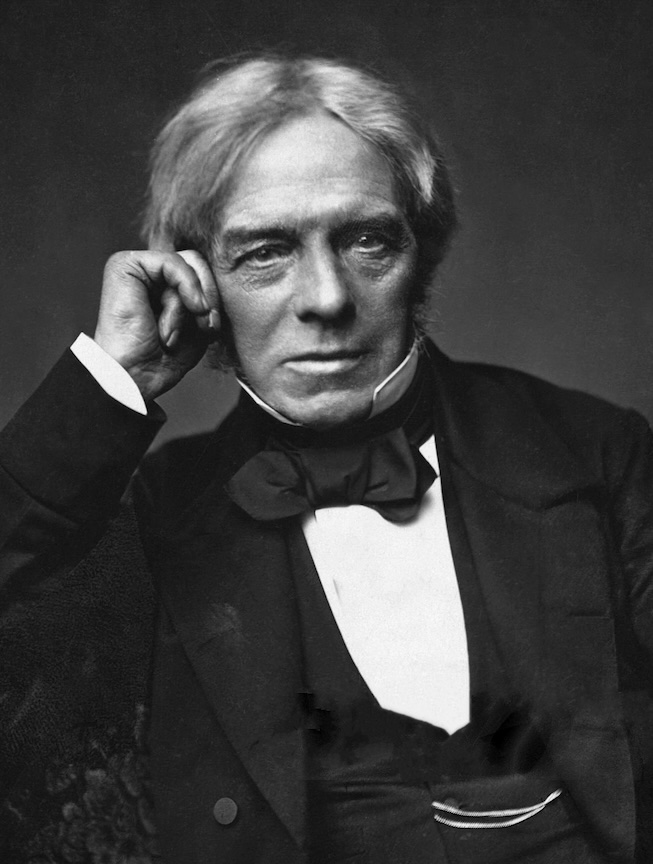Michael Faraday (1791-1867)

Acclaimed English chemist and perhaps the greatest experimental physicist ever, Faraday was the first to isolate benzene and synthesize chlorocarbons. His master work was in the field of electricity. Over the course of four decades, Faraday published papers detailing his work on electromagnetic induction, electrolysis, and the ability of magnetism to rotate polarized light, among other discoveries. Interestingly, Faraday was known for taking on no students, working only with an assistant.
Michael Faraday (1791-1867) was one of the most influential scientists in history, making groundbreaking contributions to the fields of electromagnetism and electrochemistry. Born on September 22, 1791, in Newington Butts, England, Faraday came from a humble background. His father was a blacksmith, and the family struggled financially. Faraday received only a basic education, leaving school at the age of 14 to become an apprentice to a bookbinder. It was through this apprenticeship that Faraday developed a love for reading and a curiosity about the natural world.
Faraday's life changed when he attended a series of lectures by the renowned chemist Humphry Davy at the Royal Institution. Fascinated by Davy’s work, Faraday took extensive notes and bound them into a book, which he later sent to Davy, along with a request for employment. Impressed by Faraday’s dedication and potential, Davy offered him a job as a laboratory assistant in 1813. This opportunity marked the beginning of Faraday’s illustrious career in science.
Faraday’s early work involved chemistry, and he made significant contributions in this field, including the discovery of benzene and the invention of an early form of the Bunsen burner. However, it was his work in electricity and magnetism that truly distinguished him. In 1821, inspired by the work of Hans Christian Ørsted, who had discovered that an electric current produces a magnetic field, Faraday conducted experiments that led to the discovery of electromagnetic rotation—the principle behind the electric motor. This was a pivotal moment in the development of electromagnetism and laid the foundation for modern electrical engineering.
Faraday’s most famous work came in 1831 when he discovered electromagnetic induction, the process by which a changing magnetic field can induce an electric current in a conductor. This discovery, which Faraday demonstrated using a simple experiment involving a coil of wire and a magnet, led to the development of the dynamo, the forerunner of the modern generator. Electromagnetic induction is a fundamental principle in the generation of electricity and is still used in power generation today.
Faraday also made significant contributions to electrochemistry. He formulated the laws of electrolysis, which describe the relationship between the amount of substance deposited or dissolved during electrolysis and the quantity of electricity that passes through the substance. These laws were crucial in advancing the understanding of chemical reactions involving electricity.
Despite his lack of formal education, Faraday’s intuitive understanding of science and his meticulous experimentation made him one of the most respected scientists of his time. He was also an exceptional communicator of science, delivering numerous public lectures at the Royal Institution, including the famous Christmas Lectures, which continue to this day.
Faraday was deeply religious, and his faith influenced his scientific work. He believed that nature was a reflection of the divine and that scientific inquiry was a way to understand the workings of God’s creation. This belief gave him a sense of purpose and humility, qualities that endeared him to his colleagues and the public alike.
In recognition of his contributions, Faraday received numerous honors, including the Royal Medal of the Royal Society. Despite his achievements, Faraday remained humble and declined offers of knighthood and the presidency of the Royal Society, preferring to be known simply as "Mr. Faraday."
Michael Faraday passed away on August 25, 1867, leaving behind a legacy that continues to shape the modern world. His discoveries laid the groundwork for the development of electric power and countless other technologies, and his approach to scientific inquiry remains a model for researchers today. Faraday's life is a testament to the power of curiosity, perseverance, and the pursuit of knowledge.
 >
>